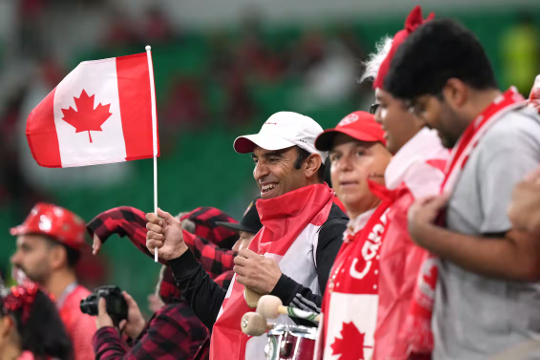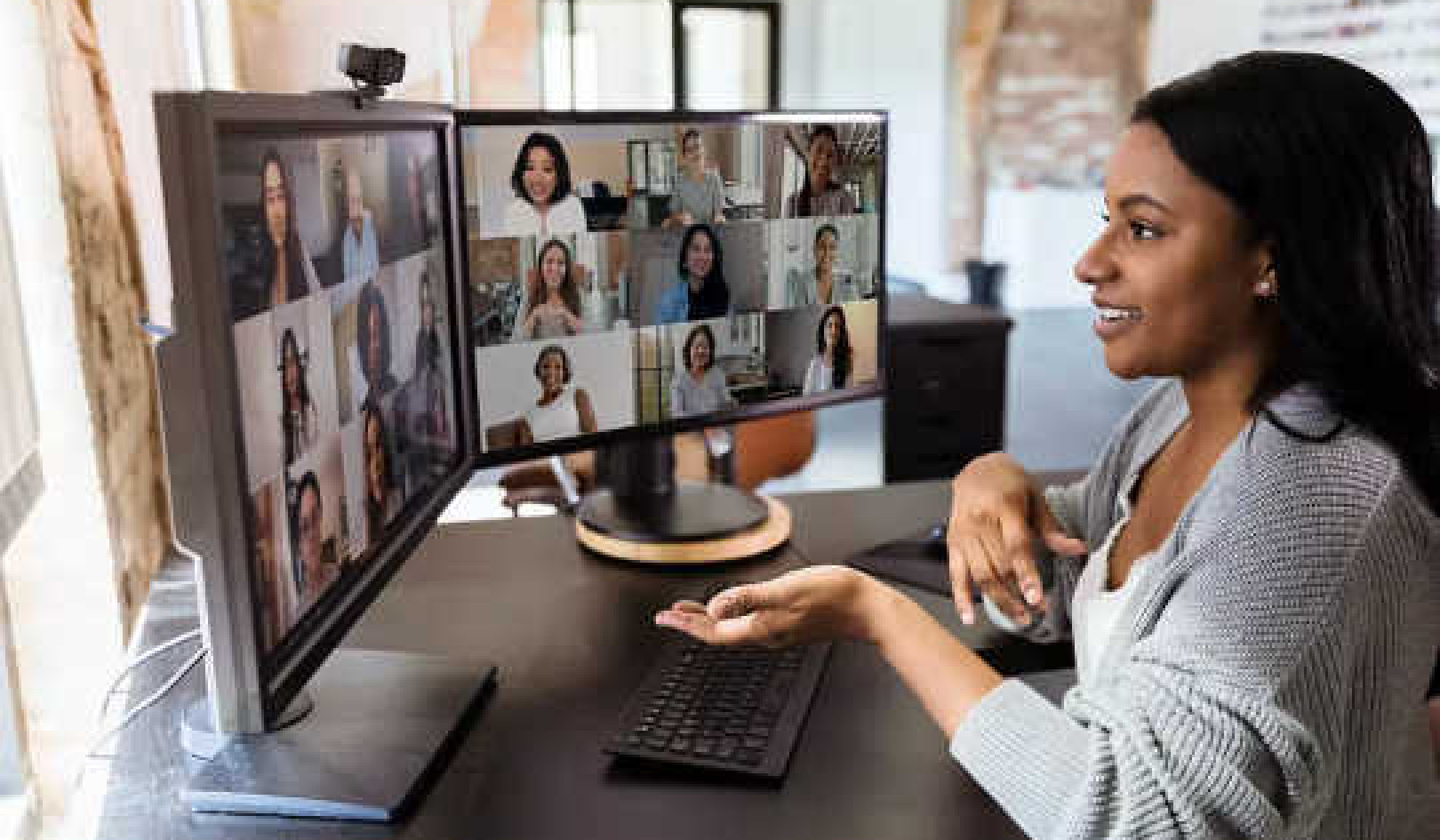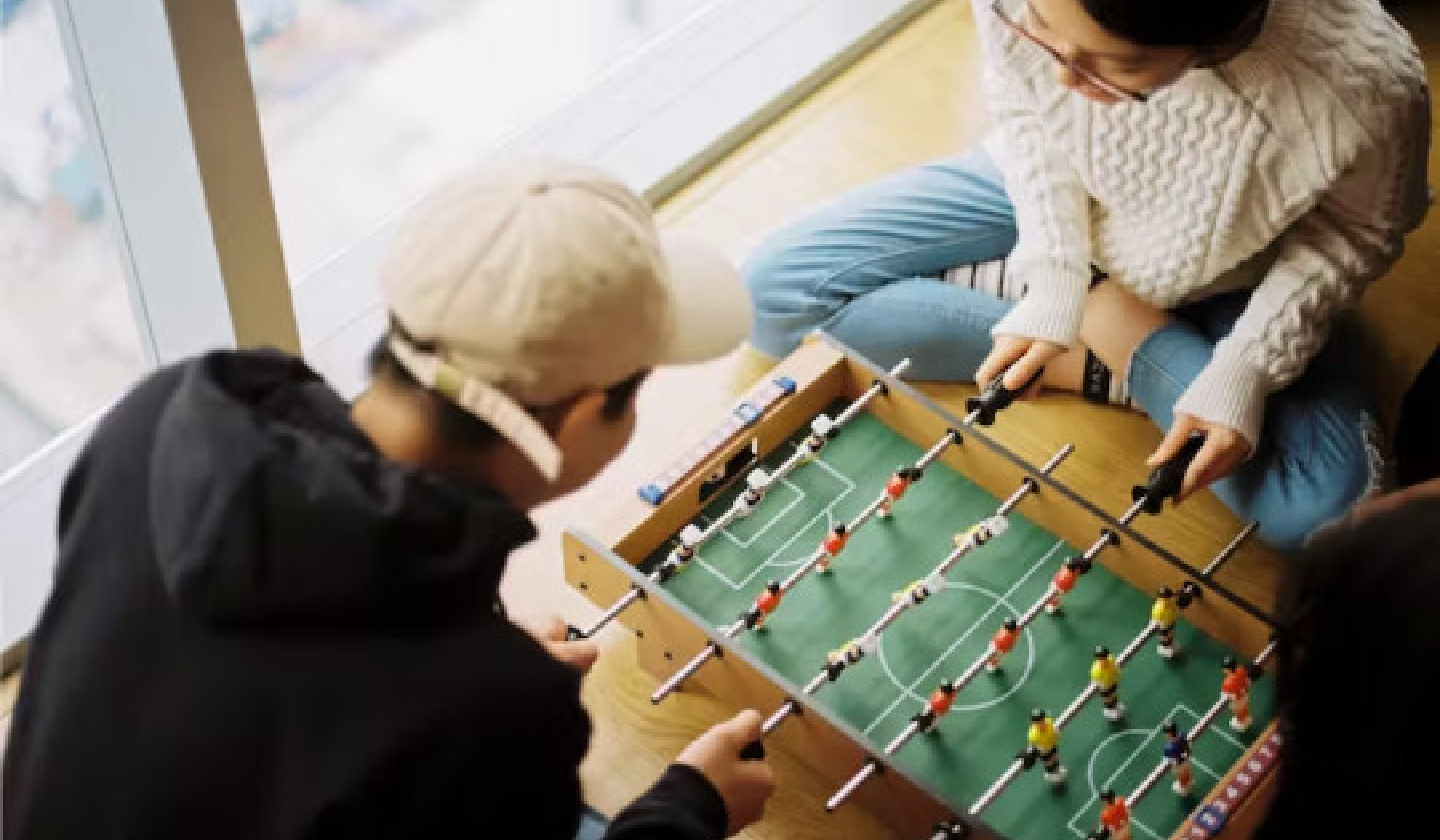
Canada fans cheer the Canadian soccer team during the 2022 FIFA World Cup in Qatar. Shared national identity can lead to players receiving more support from fans. THE CANADIAN PRESS/Nathan DenetteAires. While shared nationality is a factor, most fans typically think about players in terms of their club team. (AP Photo/Mario De Fina)
On Dec. 18, 2022, Argentina defeated France after penalties in what some have called the greatest World Cup final ever. For one month the attention of soccer fans from Brazil to Morocco was devoted to their national teams as the Seleção Canarinho, Atlas Lions and 30 other teams battled through the tournament in Qatar.
Now fans’ focus is returning to Real Madrid, Chelsea, AC Milan and other clubs, as the major domestic leagues resume matches. Argentina’s hero, Lionel Messi and France’s superstar Kylian Mbappé, rivals on the pitch in Qatar just a few weeks ago, are now back in their familiar roles as teammates at Paris Saint-Germain.
Soccer players compete for a professional club but also hail from different, sometimes rival, countries. This duality provides a natural laboratory to study a question that has preoccupied social scientists for decades: How do our group memberships affect our behaviour? We recently published research from a study on the impact of group identity on behaviour among over 400,000 soccer fans from 35 countries.
We found that national identity leads to more in-group support from fans but team identity has no effect. And that soccer fans offer less support for players who have left the club they support.
Us vs. Them
Social Identity Theory holds that group membership provides us with a sense of belonging and raises self-esteem. We tend to categorize people in terms of group memberships, dividing the world into “Us” and “Them.” We often favour individuals belonging to our same social group and discriminate against those in the out-group.
Studying this behaviour is difficult. Experiments offer a way to isolate effects, but laboratory studies are usually highly artificial and experiments set in the real world typically require participants to make decisions based on very little information. These factors limit how far findings can be generalized.
To overcome these challenges, we partnered with a popular soccer app, Forza Football to design an experiment studying the role of social identities in decision-making. The experiment was conducted during Forza’s annual poll to determine the world’s best soccer player.
We randomly altered the information users saw on the ballot in the 2018 poll to include either the players’ nationality, their professional club or just their name and photo. Forza users saw one of these three ballots and clicked on the player they thought was best.
The 10 players in the poll played for 10 different clubs and hailed from 10 different countries. After a record breaking 2018 season, it was no surprise Liverpool’s Mohamed Salah won the poll.
Shared nationality a factor
We also knew users’ favourite clubs as well as their nationality. This allowed us to test how individuals vote when a player was presented as either belonging to their social group or being from an out-group.
For example, when we showed a Belgian Manchester United supporter that Kevin de Bruyne is Belgian, we create a shared identity. But if we show the same person that de Bruyne plays for rival club Manchester City, we create an unshared identity.
We found strong evidence of in-group favouritism based on national identity. Presenting players’ nationalities in addition to their names and photos increased in-group voting by 3.6 per cent compared to when nationality was absent.
On the other hand, providing information about a player’s professional club didn’t change voting behaviour. In other words, a person was more likely to vote for a player who is of the same nationality. While a fan sharing a club with a player had no effect on voting.
So, a Portuguese user who saw that Cristiano Ronaldo is Portuguese, for example, was significantly more likely to vote for him than a Portuguese user who saw a ballot with just names and photos.
The disparate effect of shared club and national identity is likely due in part to the prominence of each identity. Soccer fans typically think about players in terms of their club team, not their national team. As a result, our subtle prime was more effective in raising the salience of the national identity than club affiliation.
We also measured how strongly fans identify with their favourite team and their nationality. It turns out, unsurprisingly, the effect of nationality on voting is greatest among individuals for whom that identity is more important.
Voting for and voting against
People not only voted for their in-group, they voted against candidates in their out-group. Professional soccer players sometimes change teams in transfers.
This creates a great test of the idea that individuals actively vote against someone they view as an out-group candidate.
For example, in 2017 Mohamed Salah moved to his current club, Liverpool, from the Italian team AS Roma. This means for Roma supporters, Salah was in the in-group but is now in the out-group.
When presented with a ballot highlighting the fact a former in-group member is now in the out-group (on a different team), users were significantly less likely to vote for the player.
For these fans, providing team information caused a 6.1 per cent decrease in voting for an out-group player.
Sports matters beyond the field of play
Recent research by a team of political scientists has indicated star players like Salah can reduce prejudice. They found Islamophobia declined in the Liverpool area because of Salah’s presence.
But what happens when Salah stops scoring or changes team? Our results suggest sports fans might be quite fickle and that strongly identifying with the in-group is directly related to a backlash effect toward out-groups.
Sports reflect, reveal and shape major social, economic and political values and changes. Sometimes sports is used to bridge or widen ethnic, racial, religious and partisan divides.
For example, researchers have studied racial bias by looking at foul calls in the NBA, how sports success can help unite divided societies and how playing sports together can foster co-operation. Our study follows this trend and provides insights from the sports world on how group identity affects behaviour.
The effect of perceiving a shared or unshared group identity is likely small in any particular interaction. But the results of our large-scale study suggest relatively small changes in the prominence of group identities can alter behaviour. This has implications for how ballots are designed, how advertisers target, how social justice campaigns are rolled out and myriad other decision-making scenarios.![]()
About The Authors
Daniel Rubenson, Professor of Political Science, Toronto Metropolitan University and Chris Dawes, Associate Professor of Politics, New York University
This article is republished from The Conversation under a Creative Commons license. Read the original article.

Related Books:
Atomic Habits: An Easy & Proven Way to Build Good Habits & Break Bad Ones
by James Clear
Atomic Habits provides practical advice for developing good habits and breaking bad ones, based on scientific research on behavior change.
Click for more info or to order
The Four Tendencies: The Indispensable Personality Profiles That Reveal How to Make Your Life Better (and Other People's Lives Better, Too)
by Gretchen Rubin
The Four Tendencies identifies four personality types and explains how understanding your own tendencies can help you improve your relationships, work habits, and overall happiness.
Click for more info or to order
Think Again: The Power of Knowing What You Don't Know
by Adam Grant
Think Again explores how people can change their minds and attitudes, and offers strategies for improving critical thinking and decision making.
Click for more info or to order
The Body Keeps the Score: Brain, Mind, and Body in the Healing of Trauma
by Bessel van der Kolk
The Body Keeps the Score discusses the connection between trauma and physical health, and offers insights into how trauma can be treated and healed.
Click for more info or to order
The Psychology of Money: Timeless lessons on wealth, greed, and happiness
by Morgan Housel
The Psychology of Money examines the ways in which our attitudes and behaviors around money can shape our financial success and overall well-being.
























